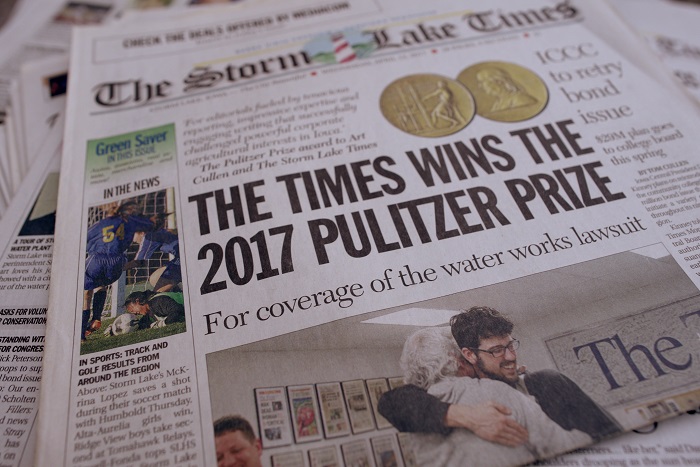Storm Lake (Levinson and Risius, 2021)
Some of my favorite documentaries are about stories that change drastically as they are being filmed. Lauren Greenfield’s The Queen of Versailles is one example. What begins as a straightforward profile of a rich couple takes a dramatic turn when the financial collapse of 2008 occurs. There is no way that Greenfield could have known that these events would happen when she began filming, but the resulting film is richer and more layered than anything that I could imagine was originally intended.
But the unexpected doesn’t always happen, so the great documentarian must do more than turn on a camera and hope that something dramatic materializes. I am convinced that true genius in the documentary lies not in predicting the future but in being able to adapt to the unpredictable as it unfolds. This must be terrifying, of course, because it involves abandoning plans and preparations with no clear outcome predetermined.
The Covid-19 global pandemic is one such unexpected event. It begins about two-thirds of the way through Storm Lake. But rather than transform the film, it simply interrupts it. Consequently, while Storm Lake is engaging, it never quite finds a unifying theme or thread that will focus its interesting parts into something truly great. It’s interesting, yes, and it is always engaging. But when a film resorts to postscript textual notes to reframe the material, that can be a sign that the film proper never quite came together in the editing room.
The film’s subject is The Storm Lake Times, a Pulitzer Prize winning Iowa newspaper with a circulation of around 3,000. Those expecting anything more than a summary of why the film won this prestigious award will search in vain. They did so because of tenacious reporting and the leadership of Art Cullen. Okay, so perhaps it will be a profile of those reporters in action. After all, the Iowa Caucuses for the 2020 presidential election cycle are underway. Indeed, as anyone who followed last year’s election knows, the Iowa Caucus (don’t call it a primary) was a major international story due to problems recording the results. Yet after following the newspaper editor interviewing some caucus participants, the documentary abruptly shows us a headline from the paper and an interview with Cullen talking about how the process failed. On to the next story…
The question of how the paper can remain financially viable is both interesting and important. Is The Times the last of a dying breed or has it found some secret recipe for staying afloat in an era where people prefer their news to be free, partisan, and entertaining? That question is not exactly resolved. Cullen works for free since he is supported through other sources of income. The pandemic section gives us hand-wringing sound bites saying that the paper cannot survive, followed by a postscript telling (but not showing) us that it did.
It is ironic and symbolic that the film begins with the paper facing a publication deadline, uncertain what the lead story for the next edition should be, and fretting about the costs of further delays. That opening becomes an emblem for the movie itself — it is a worthy vehicle doing important work. But documentarians are like reporters. Some days the story they are covering is dramatic and practically writes itself. Some days they have to frame the story so that readers and viewers understand not just what happened but also why it is significant.
Storm Lake premieres this week at the Full Frame Documentary Film Festival. For a list of forthcoming venues screening the film, click here.

